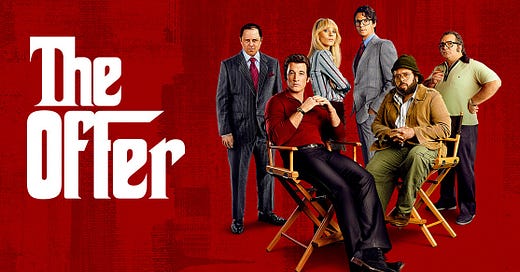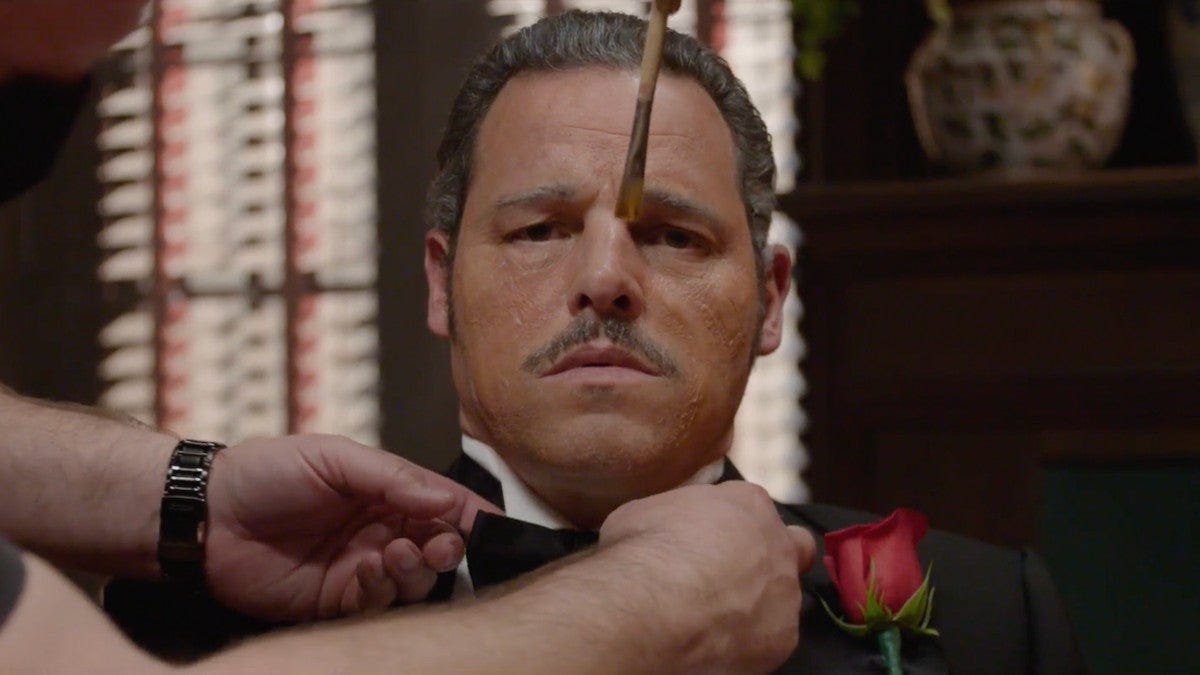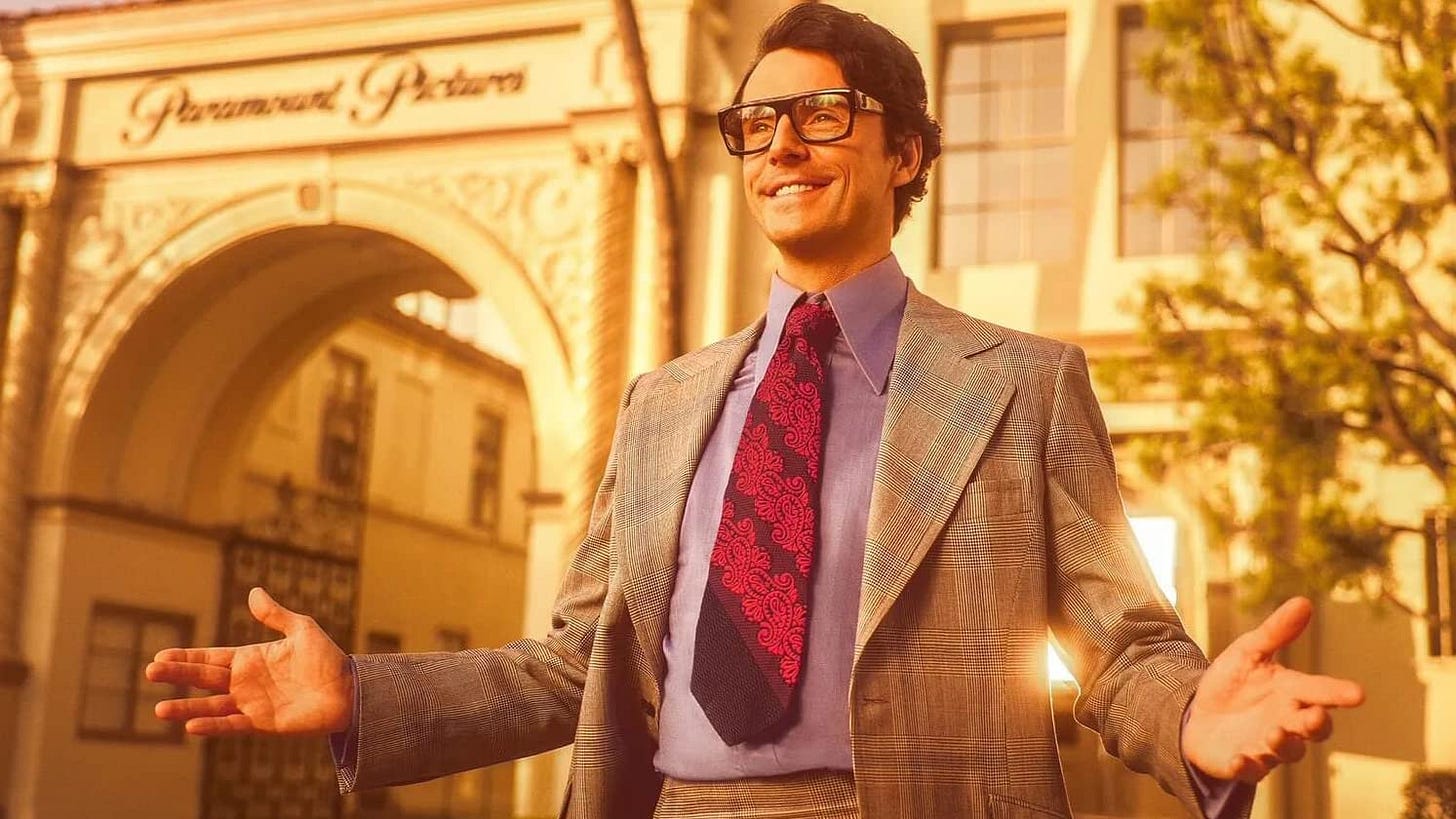I watched The Offer recently (Paramount+), a ten-part, dramatized re-telling of the making of The Godfather.
The show’s main strength is its plot which is surprisingly complex and enjoyably unpredictable, if questionably fast-paced. It’s the only reason I finished the show, which I almost abandoned numerous times due to the at-times cringeworthy writing and hit-or-miss performances. Plot-driven shows are weird like that. They’re often “entertaining” because lots of stuff happens episode to episode but it’s a red flag as a primary selling point. Big parenthetical incoming…
(Half-decent TV shows do one of the following well: plot, character development or world-building. Good shows have two of three. The very best also have two of three, but one is always character development. Then there’s seasons 1-5 of Game of Thrones.
The Wire — character/world
The Sopranos — character/world
Mad Men — character/world
Breaking Bad — character/plot
Game of Thrones — seasons 1-5 had all three; seasons 6-8… did not.
The Offer — plot/world)
As an LA native, I had plenty of fun spending ten episodes in a big-budget recreation of 1970s Hollywood with its cars, swanky hotels, and hilltop midcentury residences. To say nothing of the charming recreations of The Godfather’s many famous sets.
I mentioned the acting was spotty, but the casting was fun. Miles Teller doesn’t have the louche appeal this role requires, but he brings a peculiar likeability to his take on Ed Ruddy, the hard-nosed amateur producer of The Godfather. Anthony Ippolito is a spitting image of young Al Pacino, albeit with an infuriating accent. Justin Chambers is ~fantastic~ as an aging Marlon Brando.
Most controversially… there’s Matthew Goode, who plays the charismatic, party-boy head of paramount studios, Robert Evans. His performance is undoubtedly impressive, nailing (if slightly overcooking) Evans’ peculiar vocal affectation (as a British actor no less). But it falls short due to the aforementioned mediocre writing and typical 1970s character arc of: successful maverick does too much cocaine > watches movies in a private theater surrounded by empty liquor bottles > becomes a shadow of his former self > eventually finds redemption through nothing other than his own will-power. Goode deserves an award for something, but not for playing a real human being.
And that brings me to my gripe with Hollywood stories like this. The people that make them are too close to the source material and can’t help but mythologize even the most mundane aspects of their jobs. Among the worst examples of this… there’s a scene where a casting director explains to another paper-pushing character about how their jobs as Hollywood executives differ from the work of “civilians” in that they are artists, risking it all in the pursuit of bringing beauty to the world. Relax.
Shows about Hollywood will always be tainted by some amount of delusion. What’s funny though is Hollywood is very good at making shows about itself unintentionally. Mad Men, for example, is the ultimate show about Hollywood. The people who made it gave a stark, realistic, and often unflattering portrayal of an outwardly glamorous industry that attempts to turn creativity into money. It wasn’t about the industry or what it produces; it was about how that process affects the people who bring that work to fruition. That’s where The Offer misses the mark. The show purports to be about the glorious triumph of artists over industry bureaucrats and bean-counters, and it does that well, but the subtext is that this is the industry standard. In reality… stifling creatives, letting projects rot in development hell, and refusing to gamble on new creators and formats is the rule, not the exception.
Entourage also did right by Hollywood albeit with a different approach. That show glamorized the industry to the point of grotesque absurdity and was therefore somewhat accurate in its own twisted way. By making fun of the real-life irrelevance of its own cast and having them cosplay as movie star and hangers on, the creators perfectly encapsulated the reality of the industry which is that everyone is either trying to become more famous than they currently are or trying get to know someone who is.
The Offer occupies a middle ground, trading on and dramatizing the romance of one of history’s greatest films just to show you that yes, occasionally art does triumph. But you have to be skeptical when you account for the fact that The Offer is a Paramount Studios production, the very studio whose overlords once tried to throttle the creation of this very movie fifty years ago.






I won’t take this Wire slander.
Otherwise great read. Still have a lot of TV to work through.